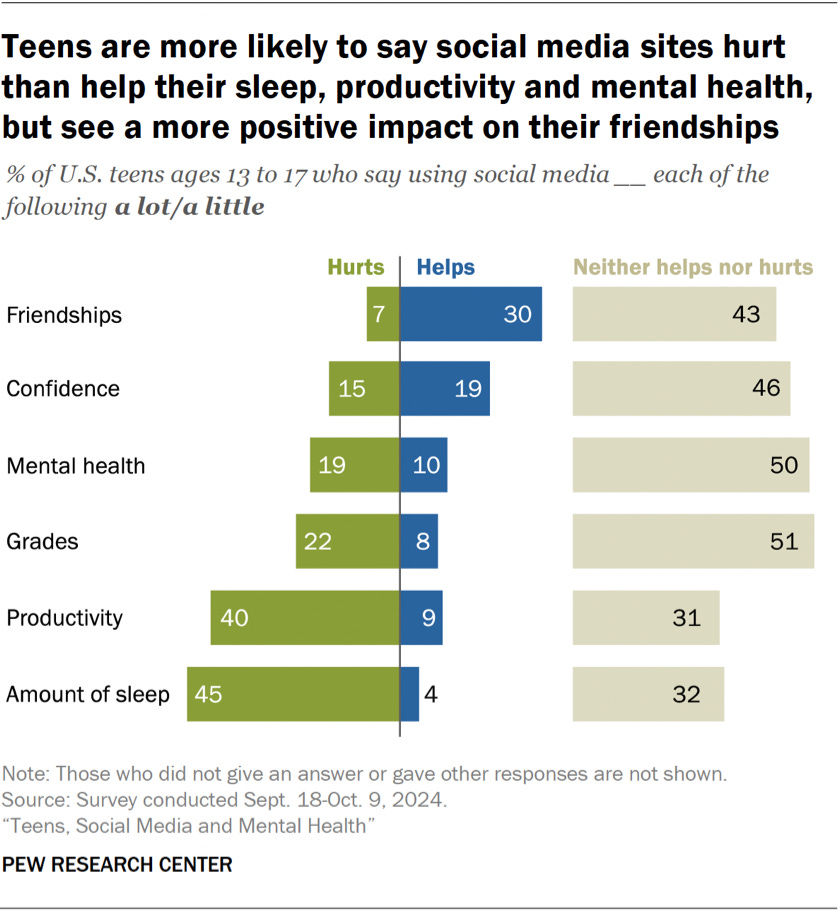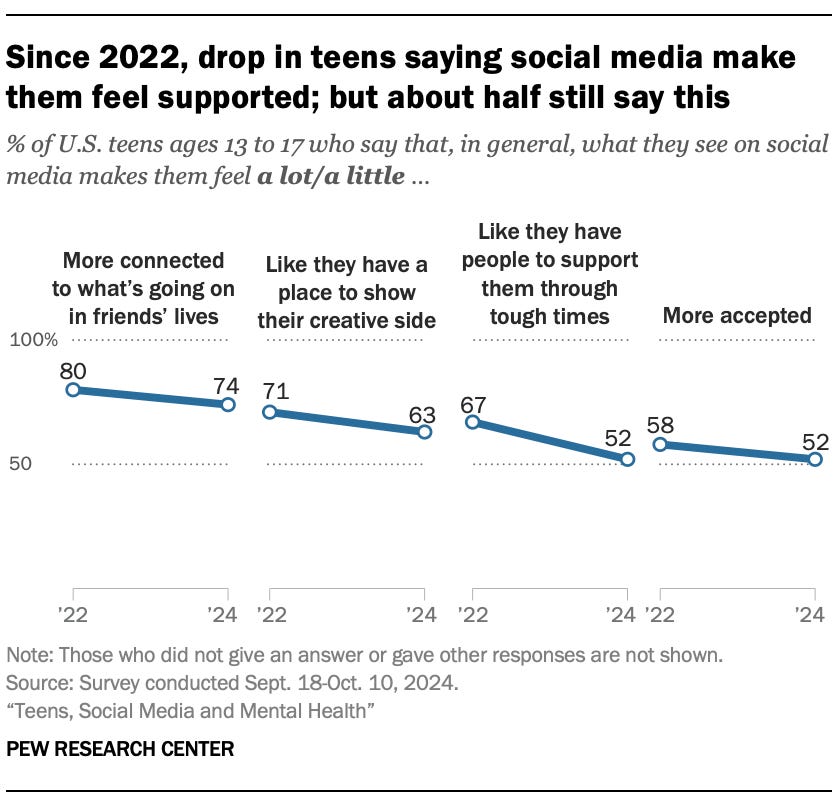Teens vs. Social Media: Five Charts That Show What They Really Think
48% of teens say social media is bad for them, according to new Pew Research Center data. Moving forward, that stat will shape their on-platform engagement.

Teens are increasingly aware of how social media may be harming them, and it’s beginning to shape how they use Big Tech-owned platforms.
In 2022, just 32% of teens ages 13-17 said social media had a negative effect on people their age, according to a Pew Research Center study at the time. Today, 48% of teens age 13-17 say the same – a 16-point jump in a three year time span, according to new data released today by Pew.
The new study on ‘Teens, Social Media and Mental Health’ examines ever-evolving dynamics between teens and their devices.
Many teens know they spend too much time online
Of all the data points shared, this is one I’m increasingly observing in my own research: A sizable chunk of teenagers (45%) report spending “too much” time online. That number is up 9 points from 36% in 2022.
In my own listening sessions, I often hear young people describe social media as a vice – they know it isn’t always good for them, but it’s something they have a hard time restricting.
But there’s an interesting caveat here, too. According to Pew’s data, teens are more likely to believe social media is bad for their peers than for themselves.
Nearly half of teens (48%) report that social media has a ‘mostly negative’ effect on people their age, while just 14% say they see it having a ‘mostly negative’ effect on themselves (though that number is rising too, up from 9% in 2022). They’re more inclined to see the harm social media has on others’ lives than in their own day-to-day experience.
Where social media is harming teens, according to teens
Teens say social media is the most harmful when it comes to their sleep and productivity habits, Pew’s data shows. On the flip side, they say it’s the most helpful in friendships and boosting confidence.
So while the comparison matrix of social media can certainly take a toll on a teen’s mental health, apparently the dopamine-like hit from likes and shares boosts confidence, too.
It’s not all doom and gloom. 74% of teens say that social media helps them feel “more connected to what’s going on in friends’ lives,” and for 63% of teens, social media is “a place to show their creative side,” the study found.
The teen social media gender gap
There’s a gender gap in social media’s effect on teens, too. Unsurprisingly, given what we know about teen girls and the mental toll of social media, the negative impact of social media is worse for teen girls. With the one exception being its effect on their grades, teen girls report social media being worse for their sleep, productivity, mental health, confidence, and friendships than their teen boy counterparts report it is for their own.
A dip in positive feelings of social media as an avenue for support
And since 2022, teens are less likely to say social media helps them feel supported. Across all metrics measured — from connection to friends’ lives, to a forum for creativity, a tool that shows them their support system, and a place for acceptance — in 2024, teens were less likely to see the benefit of social media in this way than they were in 2022.
To learn more about how young people feel about their own social media use, check out Savannah Sellers’ NBC report on the Pew survey. As one young man told Sellers: “Everything would be much simpler without social media.”
My takeaway: Maybe it’s increased awareness and conversation about the downsides of social media, especially for a generation that literally grew up online amid the Covid-19 pandemic, but today’s teens are certainly more in tune with social media’s pitfalls than those just a few years older than them were.
Moving forward, this means that social media platforms are going to have to grapple with skeptical users who might be more prone to log-off than the (sub)generation that came before them.
As for how teens will use social platforms, I expect to see more teens using social media as a space for community-oriented conversations and planning IRL events. I also see teen’s hunger for engagement between high profile accounts and their own (they’ll be in your dm’s, and they’re looking for a reply).
I’m also bullish on even more of an emphasis on sharing the real and unfiltered — i.e. the good, the bad, and the ugly — rather than content meant to give off a certain vibe or aesthetic. That was very millennial coded.
Noteworthy reads
Why US Men Think College Isn’t Worth It Anymore, Francesca Maglione for Bloomberg
Gen Z Re-evaluates Its Budgets as a Global Trade War Rages, Paulette Perhach for The New York Times
“Polyworking” Is Gen-Z’s Answer to Surviving a Fraught Job Market, Ariana Marsh for Harper’s Bazaar







As a Gen Zer, love how you highlighted creativity and friendship stats. So much of my career and personal life have been improved by sharing my work online with cool people 🙂↕️
The nonprofit I work for actually just released a study about Gen Z, mental health, and social media (see here: madeofmillions.com/remapping-recovery) so I also would like to point out how social media can help fill in educational gaps (especially for marginalized communities!!!) And how Gen Zs who self diagnose often pair it with a professional diagnosis down the line.
All that being said, I’m always weary of people who paint social media as all good or all bad. Realistically, it’s going to stick around, so it’s important to see it as a tool to be used responsibly.